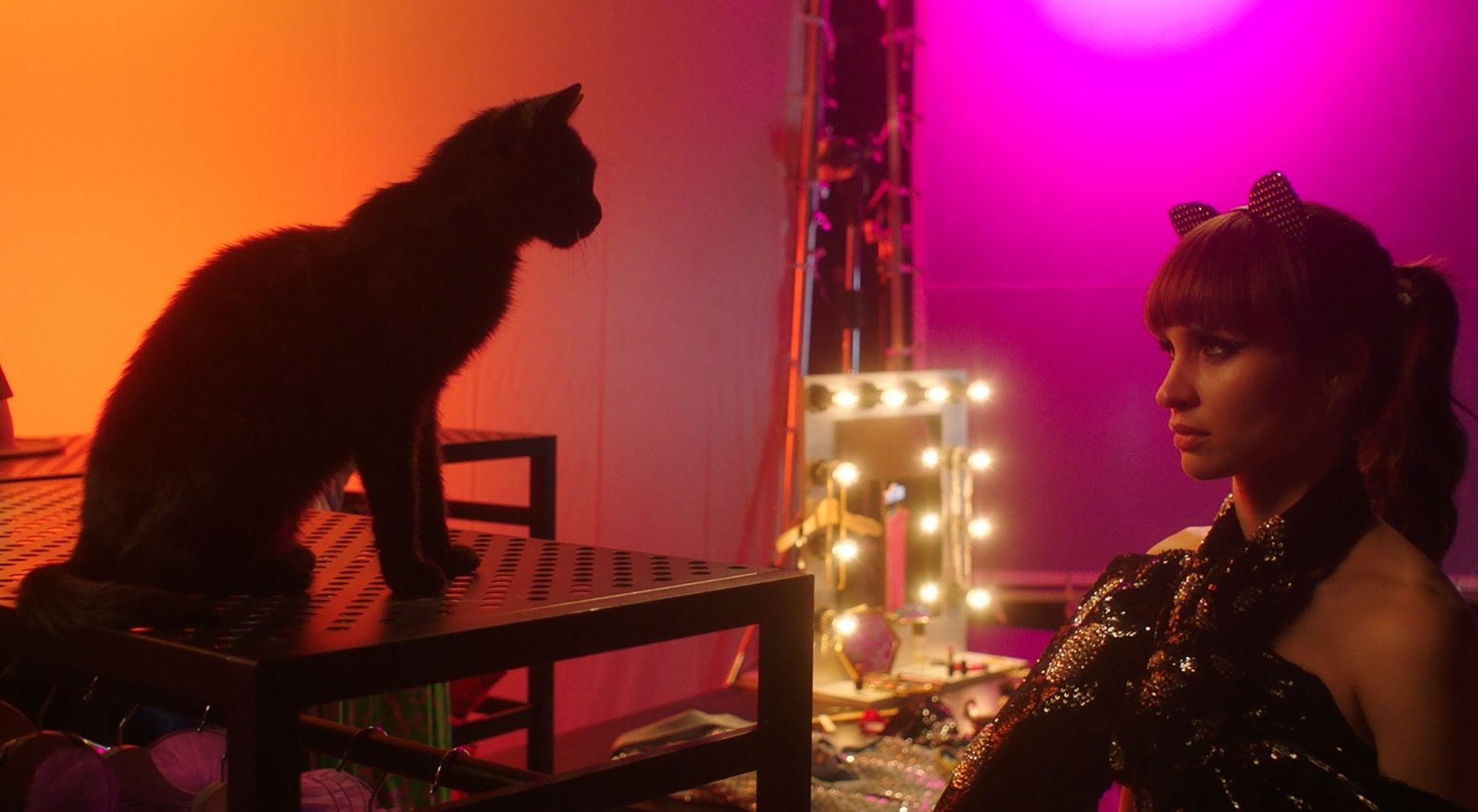
Cat Call is a comedy film featuring a talking cat as one of the main characters. The humour is twisted in a comic book-like manner but doesn’t become excessively surreal. The film addresses serious issues and is more multi-layered than it initially appears.
The main character, Fáni, turns 30 years old at the beginning of the movie. This age is a burden that weighs heavily because, by reaching this milestone, one should have achieved something greater and ideally should already have a charming life partner by their side. Fáni studied architecture but hasn’t achieved much success in that field. Although she works in an architectural firm, in a male-dominated world, her ideas and projects are considered insignificant. When a new male colleague is hired, her male coworkers are amazed by him and his ideas before he even speaks. Unfortunately, the same man ends up moving into the same building as Fáni. However, the young lady hasn’t been able to establish any reasonable relationships with the opposite sex so far because she immediately envisions the most horrific endings, literally criminally bloody demises. Thus, a black talking cat comes to her rescue, somewhat similar to Behemoth in Bulgakov's "The Master and Margarita," but not as devilish.
The film's director, Rozália Szeleczki, lives and works in Budapest; she is 35 years old. She studied film at the Gerrit Rietveld Academy in Amsterdam.
1. Please tell us a bit about your movie from the author's point of view. What inspired you to create this movie? What is your main message that you would like the audience to understand or get from this movie?
I am personally involved in this story, as I am carrying a similar trauma to the main character – Fáni. I am also dealing with the fear that if I start loving someone I will inevitably lose them. This is why it was very important for me to tell this story, and to tell it in a way that gives the viewer a reason for hope. I believe that it is possible to tell a story about loss and trauma in a light-hearted and humorous way, so that the audience may feel that it is possible to overcome such life events. I believe in the healing effect of art, and that it can be liberating to escape reality and get lost in a magical realm. I also feel that the abstraction of the cat in this film is a thought provoking and fun tool that helps the viewer get more involved in the story.
2. Tell us about the cat, how much special effects did you use for filming the cat scenes, was it difficult to create such reality? Why a cat and not a dog? Please describe in a few sentences.
Cats inherently have qualities that match the leading character. He is charming and free-spirited, but also self-sufficient, unpredictable and savage. The fact that cats are domesticated but still somehow wild makes them mysterious. So it could not be made with a dog, even if dogs are way more easily trained, while cats are one of the hardest choices. Our team of animal coordinators did an amazing job, so hardly any special effects were necessary regarding the cats. However editing was key to making their performance work.
3. It is said that making a comedy movie is harder than any other genre. You chose the comedy to be your first full-length feature movie. Please tell us why you chose comedy? Do you have some role-models in the comedy field? What kind of comedy movies do you fancy? Please describe the comedy-fenomenon for you in a few sentences.
Ironically, I wasn’t really aware of the fact that it was harder than any other genre. I only realized that in the end, actually while sitting through the domestic premier of the film last week in Hungary, hearing a 400-person audience laugh at certain points, and not laugh at others… I am a real fan of films that are able to tell a dramatic story and make you laugh at the same time, the ones that find comedy in every pain, every drama. I, as a viewer, love a film that makes me cry and laugh almost at the same time, and I wish to create such an experience for my viewers. One example of such a film from recent years was Tony Erdmann, which was a big favorite for me. However while making Cat Call my idea was to merge the genre, humour and female gaze of a classic romantic comedy, like Bridget Jones with my arthouse influences. The outcome is an unusual mix.

4. It seems to me that you had a lot of fun making this movie. Is it true or was it a lot of hard work and many bitter tears? What did you enjoy the most during the filming process?
It was definitely both. Cat Call is a very low budget film, made in the framework of the so-called Incubator Program for first-time filmmakers, so it was made with a lot of hard work and a lot of generosity and support. But what was intriguing for me, was that any time I told a new crew member or actor about the film to make them come on board with the project, they seemed to be really excited to be part of something so unique. And this enthusiasm got us through the hard times.
5. Was there room for improvisation during the filming? Did you change anything after you already had started the shooting session or did it all go as planned? Please describe in few sentences.
Márton Patkós, the actor who lends his voice to the cat, was with us on set for most of his scenes. It was important for me to shoot with this method, so that the lead actress, Franciska Törőcsik had a partner, and we recorded Márton’s voice also partly on set. On the other hand this way he was able to improvise, while watching the cat act. He could time his dialogue accordingly or add small extra pieces of sounds or words when suitable.
6. What brought you to movies? Why did you decide to start learning film-making? Was there any particular event that made you realise that this is your path? Please describe in a few sentences.
I was ‘playing cinema’ at home, giving out and collecting scribbled handwritten cinema tickets to my family, when I still couldn’t write actual words. So there must have been an admiration toward cinema, coming from my father who used to take me to the movies. Later as a teenager I was very much influenced by European New Wave cinema. I was a fan of Fellini, Godard, Tarkovsky, Chytilova, and I thought this was the highest form of art possible. I wish I was able to have such an effect on people, as they had on me. I wished I could give something back, from what I got, to the audience. I find it intriguing that those days, those authors had not just festival success, but audiences at the same time. I wish there was a tendency that these two would correlate.
7. Some movie critics would say that your movie is a feminine movie and a film made for women. What do you think? Are there masculine and feminine movies, movies that are suitable or understandable more for one gender than the other? Please describe.
I notice that films are being described like that, however it also makes me kind of uncomfortable, because I can not help but think that this is stereotypical thinking, and this kind of distinction doesn’t really exist. I believe that feminine films can be made by (and for) men and vice versa. In case femininity means focusing on emotions. Yes, I believe my film focuses on subtle emotions, we sort of dive into Fáni’s head and her feelings. However, I received several reviews that considered my film to be feminine made for women. All I know is that I can only talk about what I know, and this is what I know right now.
8. I know that many directors hate this question, but have you started working on some new movie projects? What are your expetations for the future?
I am working on two different new projects, both have a high concept element, and both are drama and comedy at the same time, and I am currently contemplating the issue of genres. I am drawn to this sort of ‘hard to be put in a box’, midcult genre, one that Cat Call falls into I believe. I wonder if it is harder to sell, but I believe I should stick to my creative instincts and vision as an artist, and continue further with this style and develop my own take on it.
9. Please tell us one wise advice that you would give to your child - what is important in life?
Find an origo, find what's important for you, and use it as a secret space inside yourself where you can retreat in hard times. Try to focus on that something, whatever that may be, and never forget it. So that you will not be sidetracked by all the influences around you.